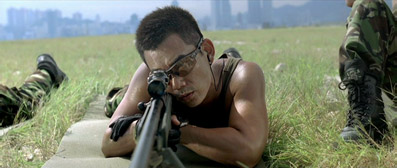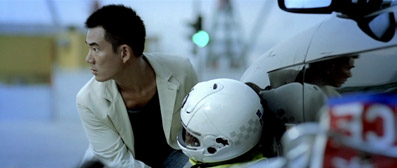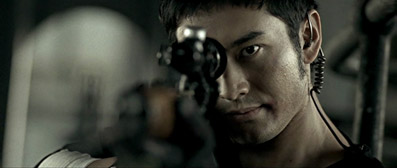|
Sniper. It's an odd word when you think about it. It means, literally, someone who snipes. And while in its military connotation the word sniper is a fearsome term, one that evokes images of camouflaged men lying secreted and shooting off a man's ear from half a mile away, the word snipe is altogether less intimidating. Make no mistake, to snipe does indeed mean to shoot at someone from a place of hiding. But it's also used to describe the process of delivering petty verbal insults, hardly the stuff of Special Forces legend. And as a noun it describes a wading bird found most commonly in marshland. In Andrew Davies' excellent A Very Peculiar Practice, the insufferable Bob Buzzard once described new boy Stephen Daker as being "so wet you could shoot snipe off his back." Just how hard is that word sounding now?
But there's a curious mystique to the role of a sniper, a man of endless patience and almost superhuman shooting ability who is able to stay hidden in one position for days, regardless of any discomfort he may endure. If he's on your side then he's a specialist whose skills could give you a serious advantage over the enemy forces. But if he's working for the enemy then he's a cowardly scumbag who kills from an emotionally safe distance and doesn't have the balls to fight you like a man. Actually capturing the true essence of what it actually means to be a sniper appears to have largely eluded filmmakers, in part because to do so would mean devoting a good part of the running time to watching our hero in almost motionless concentration, followed by a quick burst of action when he nails his target. Perhaps if Bresson had made a sniper movie...

But action movie directors are rather fond of snipers, as long as they look cool and are fast on their feet. Just like the real thing, then. Given the genre's fondness for pared-down titles, it's hardly surprising that a quick bit of research turned up five films titled Sniper, with or without the definite article (seven if you count Sniper 2 and Sniper 3), and a slew of others with Sniper in there somewhere, more if you count those that have been retitled to include the word in one country or another. The latest to hit these shores is Sun cheung sau, a 2009 crime thriller from the prolific Dante Lam and his follow-up to the well received 2008 The Beast Stalker [Ching yan]. It's a film that conforms very much to the Hong Kong crime actioner norm, in much that is good and less good in that inference.
OJ (Edison Chen, fresh from The Dark Knight and an unfortunate scandal involving some naughty photos) is a patrol cop who stumbles into a Special Unit operation that's been set up to take down a couple of dangerous criminals. When one of the team's snipers steps in to assist OJ and his injured partner, OJ demonstrates the sort of sharp eye and killing instinct that makes him an ideal candidate for the sniper squad. As he trains as part of a team commanded by chief instructor Shane (Bowie Lam) and master sharpshooter Hartman (Richie Ren), he learns about an ex-squad member named Lincoln (Xiaoming Huang), the only man who could hit a bulls eye in wind from five hundred metres. It later turns out that Lincoln was booted out of the squad after he accidentally shot a hostage in an attempt to take out a criminal named Lau. Shane is still keeping tabs on Lincoln, but is unaware that he is planning to help spring Lau from jail by providing sniper support for his criminal gang.
In what has become popular in Hong Kong genre movies since the early days of John Woo, The Sniper is reluctant to settle on a single lead character, dividing its time evenly between OJ, Hartman and Lincoln as their individual stories unfold and overlap. The wayward Lincoln appears to have been shat on from a considerable height, having taken the fatal shot at Lau for a very good reason (Lau was in the process of pulling a grenade pin), but banged up for manslaughter after Hartman refused to corroborate his story. He's not been out long when the dart-playing OJ spots him in a bar. Introducing himself, OJ gets advice on his breathing technique that goes against what he has been told by his hard-line instructors. Hartman, meanwhile, is dealing with a domestic crisis when Lincoln anonymously calls him out to witness and interfere with the gang's operation to spring their boss. So why, when he seems to be shooting every cop he can see, does Lincoln let his old rival Hartman kill half the gang and then do no more that shoot the gun from his hand? What, exactly, does thus rogue sniper have up his sleeve?

Despite some clear signals that Lincoln was the wronged party and that Hartman is a deceitful toad, the film ultimately elects to cast the former as the bad guy and have the latter play the self-sacrificing hero, the suggestion being that four years in prison has driven Lincoln a little batshit. He still has emotional conversations with his dead wife Crystal (this is not the big revelation the film probably intends it to be), and is all too willing to shoot at his own side. That he briefly acts as a mentor to young OJ is later turned around when the advice that he dishes out proves to be his Achilles' heel. Well, sort of. We're told that it is, but nothing about how the scene in which this supposed weakness is exploited suggests anything of the sort. In storytelling terms, this is run-of-the-mill stuff, and the action sequences, though enjoyably and very proficiently staged, have little to make them stand out from the busy genre crowd. Flitting between the similarly crop-haired lead characters as we do, we never really get to emotionally engage with any of them, and it probably doesn't help that the most interesting of the trio ends up being cast as the villain.
The resulting film is a brisk and snappily crafted genre piece in a too-familiar mould. Long-standing fans of Eastern action cinema should still find enough to gnaw on here, and the three standout sequences – the sniper-assistant rescue of Tao, a hotel gun battle and chase, and the inevitable final confrontation between Lincoln and his legally sanctioned opponents – are all slickly handled. But it's also dogged by elements that are starting to feel just a little old hat, from the slow-mo heroic and villainous walks to the whizzy-cam visuals, variances in image colour and slow-flying follow shots of CGI bullets. And as so often with Hong Kong actioners, tragedy is overplayed to an almost parodic degree, with unhappiness externalised through spectacular lightning and heavy rain, and deaths underscored by music that almost seems to sing, "Oh...oh he's dead...weep for him...he is no more..."
A crisp and spotless 2.35:1 anamorphic transfer with nicely judged contrast that confidently handles the film's use of of a variety of colour casts and even the occasional burst of monochrome, and boasts the sort of consistency and quality you expect (but don't always get) from a modern DVD transfer.

The choice between Dolby 5.1 surround and Dolby 2.0 stereo soundtracks, both of which are in the original Cantonese, is a matter of taste, given that the surprising subtlety of the surround on the 5.1. The surround track has a little more finesse than the stereo, so in my book still wins out.
The only one here is a clunkily assembled Trailer (1:04), one that in the tradition of promos for foreign language films avoids including any dialogue, presumably in the belief that action movie fans with a hatred of subtitles will not be clued in by the all-Chinese cast.
The Sniper is a film that pretty much delivers on expectations, being technically slick and often enjoyable but a little short on originality and substance, its characters seemingly designed more to kick the narrative forward than engage us emotionally. Not much on the disc, but the transfer is fine, so if you're a genre devotee interested only in the film then you'll have few complaints.
|